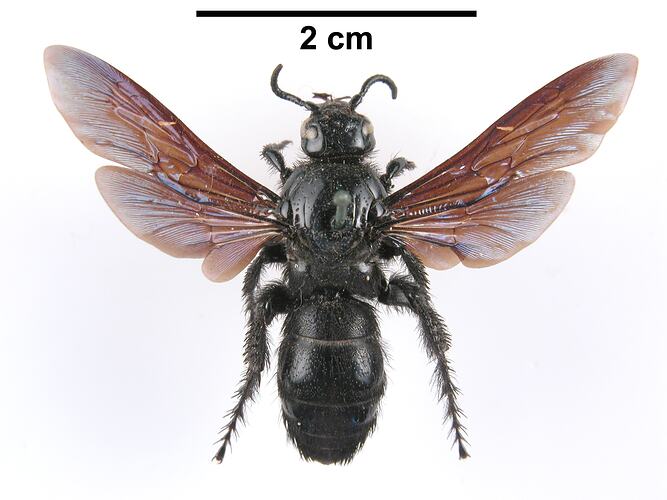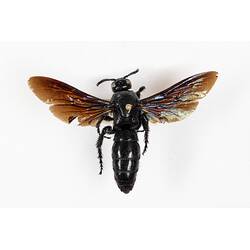General Description
Wings with distinctive, metallic, blue-purple sheen; veins reaching the margin of the wing. Body black with short antennae. Adult approximately 2.5-3 cm.
Biology
Austroscolia soror (previously in the genus Scolia is the most frequently seen species of Flower Wasp found in Victoria back yards. During the summer months Museums Victoria's Discovery Centre receives many enquiries from people who are curious about a largish blue wasp. These wasps are usually identified as this species. These wasps will most likely be seen flying just above ground level and in particular flying near or around compost heaps, wood heaps or dead stumps of trees where the female wasps are looking for beetle larvae, (usually scarab beetles but sometimes weevils). Unlike the European Honeybee, European Wasp, and some native species, the Hairy Flower Wasps do not make a nest or form colonies. If several are seen flying around a compost heap or tree stump it simply means that several wasps are investigating for beetle larvae at the same time. The wasps are strong burrowers and when they find a beetle larva they sting and paralyse it and lay an egg on it. On hatching the young wasp has a live, paralysed food source waiting for it. Adult Hairy Flower Wasps drink nectar and so are frequent visitors to flowers where their size and colour make them easy to see when sitting on a flower. Nectar provides them with food energy in the form of sugars that they use to power their wing muscles. Hairy Flower Wasps do possess a sting, but they do not have a communal hive to defend and so tend not to be aggressive.
Habitat
Urban areas.
More Information
-
Animal Type
-
Animal SubType
-
Brief Id
Flying insect with a black body and metallic blue-purple wings.
-
Colours
Black, Blue
-
Maximum Size
3 cm
-
Habitats
-
Diet
Omnivore
-
Hazards
Hairy Flower Wasps do possess a sting, but they do not have a communal hive to defend and so tend not to be aggressive. If you were to stand on one or if the wasp feels threatened it may well sting in defence. Apparently the sting is painful and people who know they have an allergy to bee or wasp stings should avoid getting stung. There are no known instances of anyone having a problem with the sting from this species other than the immediate pain.
-
Endemicity
-
Commercial
No
-
Taxon Name
-
Scientific Author
(Smith, 1855)
-
Common Name
Hairy Flower Wasp
-
Kingdom
-
Phylum
-
Subphylum
-
Class
-
Order
-
Superfamily
-
Family
-
Genus
-
Species Name
soror


